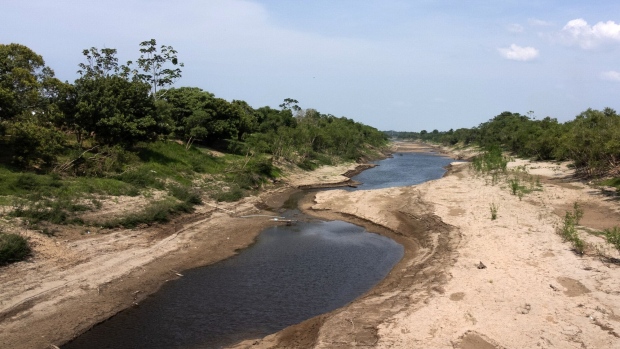Oct 5, 2023
Blackout Risk Pushes Brazil to Diesel as Amazon Drought Worsens
, Bloomberg News

(Bloomberg) -- Brazil’s government is firing up diesel power plants to avert blackouts amid a record drought in the Amazon that’s killing dolphins and snarling river logistics.
Two power plants that burn the fuel will enter in operation to guarantee enough electricity in Rondonia and Acre states during hours of peak demand, as recommended by country’s grid operator, known as ONS, in a statement late Wednesday.
Earlier this week a major hydroelectric dam on the Madeira river was shut due to low water levels, forcing the government to come up with contingency plans. The government has been stockpiling diesel since July to guarantee energy supplies. The drought has impacted more than 50 cities and triggered a state of emergency.
“The ONS is looking for an increased level of energy security,” Rivaldo Moreira, chief executive officer of consultancy Gas Energy, said in an interview, noting Brazil suffered a blackout earlier this year.
A historic drought in the Amazon has caused an increase in wildfires in recent months, and has prompted the government to start dredging some of the river’s main tributaries to prevent logistical bottlenecks. More than 100 fresh-water dolphins have died in the region, which some experts attribute to the drought and warmer water.
The ONS said weather forecasts don’t indicate an improvement in the coming days, increasing the need to “implement urgent, effective measures that continue to guarantee energy supply in the region.”
While northern Brazil is going through a drought, there has been heavy rainfall in the south and southeast of the country over the past two years. That’s left hydroelectric reservoirs at above-average levels for this time of year and will help to shield consumers from increases in overall electricity rates, even though diesel plants are more expensive to operate than hydroelectric dams, according to Celso Dall’Orto, an energy policy expert at PSR, a consultancy.
“The impact on the integrated system isn’t that large,” he said in an interview.
--With assistance from Andrew Rosati and Mariana Durao.
©2023 Bloomberg L.P.





